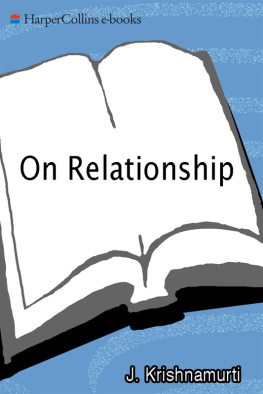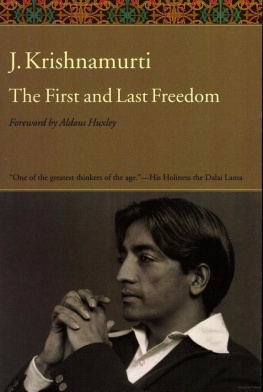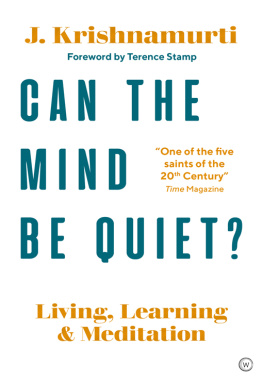Krishnamurti - The Whole Movement of Life is Learning: J Krishnamurtis Letters to His Schools
Here you can read online Krishnamurti - The Whole Movement of Life is Learning: J Krishnamurtis Letters to His Schools full text of the book (entire story) in english for free. Download pdf and epub, get meaning, cover and reviews about this ebook. publisher: Krishnamurti Foundation Trust, genre: Religion. Description of the work, (preface) as well as reviews are available. Best literature library LitArk.com created for fans of good reading and offers a wide selection of genres:
Romance novel
Science fiction
Adventure
Detective
Science
History
Home and family
Prose
Art
Politics
Computer
Non-fiction
Religion
Business
Children
Humor
Choose a favorite category and find really read worthwhile books. Enjoy immersion in the world of imagination, feel the emotions of the characters or learn something new for yourself, make an fascinating discovery.

- Book:The Whole Movement of Life is Learning: J Krishnamurtis Letters to His Schools
- Author:
- Publisher:Krishnamurti Foundation Trust
- Genre:
- Rating:4 / 5
- Favourites:Add to favourites
- Your mark:
- 80
- 1
- 2
- 3
- 4
- 5
The Whole Movement of Life is Learning: J Krishnamurtis Letters to His Schools: summary, description and annotation
We offer to read an annotation, description, summary or preface (depends on what the author of the book "The Whole Movement of Life is Learning: J Krishnamurtis Letters to His Schools" wrote himself). If you haven't found the necessary information about the book — write in the comments, we will try to find it.
The Whole Movement of Life is Learning: J Krishnamurtis Letters to His Schools — read online for free the complete book (whole text) full work
Below is the text of the book, divided by pages. System saving the place of the last page read, allows you to conveniently read the book "The Whole Movement of Life is Learning: J Krishnamurtis Letters to His Schools" online for free, without having to search again every time where you left off. Put a bookmark, and you can go to the page where you finished reading at any time.
Font size:
Interval:
Bookmark:
The Whole Movement of Life is Learning: J Krishnamurtis Letters to His Schools
This expanded edition Copyright 2006 Krishnamurti Foundation Trust Ltd
Edited by Ray McCoy
The Whole Movement
of Life is Learning
J K RISHNAMURTIS L ETTERS TO H IS S CHOOLS
J K RISHNAMURTI
CONTENTS
These schools are to cultivate the total human being
Freedom is essential for the beauty of goodness
Only in leisure can the mind learn
Goodness cannot flower in the field of fear
Accumulation of knowledge does not lead to intelligence
A human being is the whole of mankind
The whole movement of life is learning
Education is the cultivation of total responsibility
Freedom from self-occupation brings abundant energy
The school is the students home
Imitation corrupts the mind
Education is to free the mind of the limited energy of the me
Habit makes the mind insensitive
The movement of thought is not beauty
Capacity is limited by desire
Which is the honest desire or thought, and which is not?
Can the senses be supremely active without desire coming in?
When there is no measurement, there is the quality of wholeness
Physical and psychological problems waste our energy
Selfishness is the essential problem of our life
The intelligence of the body will guard its own well-being
Thought is the root of all our sorrow, all our ugliness
Relationship is the art of living
The word prevents actual perception
Learn from the book of the story of yourself
Comparison is one of the many aspects of violence
Live with clarity, which is not a value
These places exist for the enlightenment of humanity
The desire to be separate is the source of destruction
Cooperation demands great honesty
The very nature of intelligence is sensitivity, which is love
Thought uses and destroys
You have to be good because you are the future
When you care, violence in every form disappears from you
People live with ideas and beliefs unrelated to their daily lives
Action based on reward and punishment brings about conflict
Communication is learning from each other
To learn about the images we have demands self-awareness
Efficiency is not an end in itself
Freedom is the essence of thinking together
Awareness brings about subtlety, clarity of mind
Is life a movement of pain with occasional happiness?
The movement of the skies, the earth, human existence, is indivisible
To attend implies vast energy
A teacher is deeply involved with the flowering of human beings
Without the centre as a self, there is extraordinary strength and beauty
Our vital intent is to bring about a free human being
How are the few to deal with the many?
The ideal breeds conflict
Freedom has no opposite
We do not learn from wars but repeat brutality and bestiality
Humility is the essence of love and intelligence; it is not an achievement
What energy will make us move out of the commonplace?
If you hurt nature you are hurting yourself
Learning brings about equality among human beings
Revolt against the past brings only another conformity
True culture is a movement in freedom
Fear breeds authority
Separation leads to conflict
Education is to break down patterns
Obedience to the past is disorder
Conformity denies virtue
Living is action in relationship
Relationship is not intellectual
The essence of culture is complete harmony
Without responsibility there is no freedom
Relationship is society
Freedom has no authority
Learn without compulsion
Learning is discipline
Freedom is sane living in daily life
Order is the action of the new, which is intelligence
FOREWORD
As I would like to keep in touch with the schools in India, Brockwood Park in England and the Oak Grove School in Ojai, California, I propose to write a letter every fortnight to them for as long as is possible. It is difficult to keep in touch with them all personally, so, if I may, I would very much like to write these letters to convey what the schools should be, to convey to all the people who are responsible for them that these schools are to be excellent academically, but much more. They are to be concerned with the cultivation of the total human being. These centres of education must help the student and the educator to flower naturally. The flowering is really very important; otherwise education becomes merely a mechanical process oriented to a career, to some kind of profession. Career and profession, as society now exists, are inevitable, but if we lay all our emphasis on that, then the freedom to flower will gradually wither. We have laid far too much emphasis on examinations and getting good degrees. That is not the main purpose for which these schools were founded. This does not mean that the student will be inferior academically. On the contrary, with the flowering of the teacher as well as the student, career and profession will take their right place.
* *
These letters are not meant to be read casually when you have a little time from other things, nor are they to be treated as entertainment. These letters are written seriously and if you care to read them, read them with intent to study what is said, as you would study a flower by looking at the flower very carefullyits petals, its stem, its colours, its fragrance and its beauty. These letters should be studied in the same manner, not read one morning and forgotten in the rest of the day. One must give time to it, play with it, question it, inquire into it without acceptance. Live with it for some time; digest it so that it is yours and not the writers.
J Krishnamurti
1. TOTAL EDUCATION
These schools are to cultivate
the total human being
Society, the culture in which we live, demands that the student must be oriented towards a job and physical security. This has been the constant pressure of all societies: career first and everything else second; that is, money first and the complex ways of our daily life second. We are trying to reverse this process, because man cannot be happy with money only. When money becomes the dominant factor in life, there is imbalance in our daily activity. I would like the educators to understand this very seriously and to see its full significance. If the educator understands the importance of this, and in his own life has given it its proper place, then he can help the student, who is compelled by his parents and society to make a career the most important thing. I would like to emphasize this pointto maintain at all times in these schools a way of life that cultivates the total human being.
As most of our education is the acquisition of knowledge, it is making us more and more mechanical; our minds are functioning along narrow grooves, whether it is scientific, philosophical, religious, business or technological knowledge that we are acquiring. Our ways of life, both at home and outside it, and our specializing in a particular career, are making our minds more and more narrow, limited and incomplete. All this leads to a mechanical way of life, a mental standardization, and so gradually the State, even a democratic State, dictates what we should become. Most thoughtful people are naturally aware of this, but unfortunately they seem to accept it and live with it. This has become a danger to freedom.
Freedom is a very complex issue and to understand the complexity of it, the flowering of the mind is necessary. Each person will give a different definition of the flowering of the mind depending on his culture, on his education, experience, religious superstitionthat is, on his conditioning. Here we are not dealing with opinion or prejudice, but rather with a non-verbal understanding of the implications and consequences of the flowering of the mind. This flowering is the total unfoldment and cultivation of our minds, our hearts and our physical well-being; that is to have complete harmony in which there is no opposition or contradiction. The flowering of the mind can take place only when there is clear, objective, non-personal perception, when it is not burdened by any imposition upon it. It is not what to think but how to think clearly. For centuries, through propaganda and so on, we have been encouraged in what to think. Most modern education is that, and not the investigation of the whole movement of thought. Flowering implies freedom. A plant requires freedom to grow.
Font size:
Interval:
Bookmark:
Similar books «The Whole Movement of Life is Learning: J Krishnamurtis Letters to His Schools»
Look at similar books to The Whole Movement of Life is Learning: J Krishnamurtis Letters to His Schools. We have selected literature similar in name and meaning in the hope of providing readers with more options to find new, interesting, not yet read works.
Discussion, reviews of the book The Whole Movement of Life is Learning: J Krishnamurtis Letters to His Schools and just readers' own opinions. Leave your comments, write what you think about the work, its meaning or the main characters. Specify what exactly you liked and what you didn't like, and why you think so.













